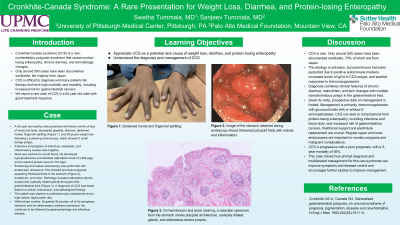Monday Poster Session
Category: Stomach
P3382 - Cronkhite-Canada Syndrome: A Rare Presentation for Weight Loss, Diarrhea and Protein-Losing Enteropathy
Monday, October 28, 2024
10:30 AM - 4:00 PM ET
Location: Exhibit Hall E

Has Audio

Swetha Tummala, BA
Boston University Chobanian & Avedisian School of Medicine
Boston, MA
Presenting Author(s)
Swetha Tummala, BA1, Sanjeev Tummala, MD2
1Boston University Chobanian & Avedisian School of Medicine, Boston, MA; 2Palo Alto Medical Foundation, Mountain View, CA
Introduction: Cronkhite-Canada syndrome (CCS) is a rare, nonhereditary polyposis syndrome that causes protein-losing enteropathy, weight loss, diarrhea, and skin changes. Around 500 cases have been documented worldwide in 50 years. CCS is difficult to diagnose and many patients fail therapy and have high morbidity and mortality. We report CCS in a 62-year-old Asian male.
Case Description/Methods: A 62-year-old healthy male presented with several weeks of bloating, loss of smell and taste, decreased appetite, diarrhea, darkened hands, and fingernail splitting (Figure 1) following a screening colonoscopy, which showed three small benign polyps. He also endorsed fifty pounds of weight loss over three months. Extensive investigation of infectious, neoplastic, and inflammatory causes was negative. Stool was positive for occult blood. He developed hypoproteinemia and markedly elevated calprotectin level to 4,260 μg/g. Endoscopy and repeat colonoscopy was performed with endoscopic ultrasound. This showed thickened polypoid folds in the stomach (Figure 1), duodenum, and colon. Pathology revealed edematous lamina propria and cystically dilated glands throughout the gastrointestinal tract (Figure 1). A diagnosis of CCS was made.
The patient was started on prednisone plus mesalamine and a high-calorie, high-protein diet. In three months, he gained twenty pounds, and all of his symptoms improved. He continues to be followed by gastroenterology.
Discussion: CCS is rare. Most reported cases are from Asia. The etiology is unknown, but an autoimmune etiology has been purported due to positive responses to immunosuppression. Diagnosis combines clinical features of chronic diarrhea, weight loss, malnutrition, and skin changes with multiple hamartomatous polyps in the gastrointestinal tract.
Management is primarily immunosuppression with glucocorticoids with or without 5-aminosalicylates. CCS can lead to complications, including infections and blood clots, and increased risk of gastrointestinal cancers. Nutritional support is crucial. Regular upper and lower endoscopies are important to monitor malignant complications.
CCS is progressive with a poor prognosis. Given its rarity, prospective data on management is limited, and there are no guidelines for monitoring. This case shows how prompt diagnosis and multifaceted management for this rare syndrome can improve symptoms and disease control and encourages further studies to improve management.

Disclosures:
Swetha Tummala, BA1, Sanjeev Tummala, MD2. P3382 - Cronkhite-Canada Syndrome: A Rare Presentation for Weight Loss, Diarrhea and Protein-Losing Enteropathy, ACG 2024 Annual Scientific Meeting Abstracts. Philadelphia, PA: American College of Gastroenterology.
1Boston University Chobanian & Avedisian School of Medicine, Boston, MA; 2Palo Alto Medical Foundation, Mountain View, CA
Introduction: Cronkhite-Canada syndrome (CCS) is a rare, nonhereditary polyposis syndrome that causes protein-losing enteropathy, weight loss, diarrhea, and skin changes. Around 500 cases have been documented worldwide in 50 years. CCS is difficult to diagnose and many patients fail therapy and have high morbidity and mortality. We report CCS in a 62-year-old Asian male.
Case Description/Methods: A 62-year-old healthy male presented with several weeks of bloating, loss of smell and taste, decreased appetite, diarrhea, darkened hands, and fingernail splitting (Figure 1) following a screening colonoscopy, which showed three small benign polyps. He also endorsed fifty pounds of weight loss over three months. Extensive investigation of infectious, neoplastic, and inflammatory causes was negative. Stool was positive for occult blood. He developed hypoproteinemia and markedly elevated calprotectin level to 4,260 μg/g. Endoscopy and repeat colonoscopy was performed with endoscopic ultrasound. This showed thickened polypoid folds in the stomach (Figure 1), duodenum, and colon. Pathology revealed edematous lamina propria and cystically dilated glands throughout the gastrointestinal tract (Figure 1). A diagnosis of CCS was made.
The patient was started on prednisone plus mesalamine and a high-calorie, high-protein diet. In three months, he gained twenty pounds, and all of his symptoms improved. He continues to be followed by gastroenterology.
Discussion: CCS is rare. Most reported cases are from Asia. The etiology is unknown, but an autoimmune etiology has been purported due to positive responses to immunosuppression. Diagnosis combines clinical features of chronic diarrhea, weight loss, malnutrition, and skin changes with multiple hamartomatous polyps in the gastrointestinal tract.
Management is primarily immunosuppression with glucocorticoids with or without 5-aminosalicylates. CCS can lead to complications, including infections and blood clots, and increased risk of gastrointestinal cancers. Nutritional support is crucial. Regular upper and lower endoscopies are important to monitor malignant complications.
CCS is progressive with a poor prognosis. Given its rarity, prospective data on management is limited, and there are no guidelines for monitoring. This case shows how prompt diagnosis and multifaceted management for this rare syndrome can improve symptoms and disease control and encourages further studies to improve management.

Figure: Figure 1. A-Darkened hands and fingernail splitting. B-Image of the stomach obtained during endoscopy shows thickened polypoid folds with edema and inflammation. C-On hematoxylin and eosin staining, the stomach shows polypoid architecture, cystically dilated glands, and edematous lamina propria.
Disclosures:
Swetha Tummala indicated no relevant financial relationships.
Sanjeev Tummala indicated no relevant financial relationships.
Swetha Tummala, BA1, Sanjeev Tummala, MD2. P3382 - Cronkhite-Canada Syndrome: A Rare Presentation for Weight Loss, Diarrhea and Protein-Losing Enteropathy, ACG 2024 Annual Scientific Meeting Abstracts. Philadelphia, PA: American College of Gastroenterology.
